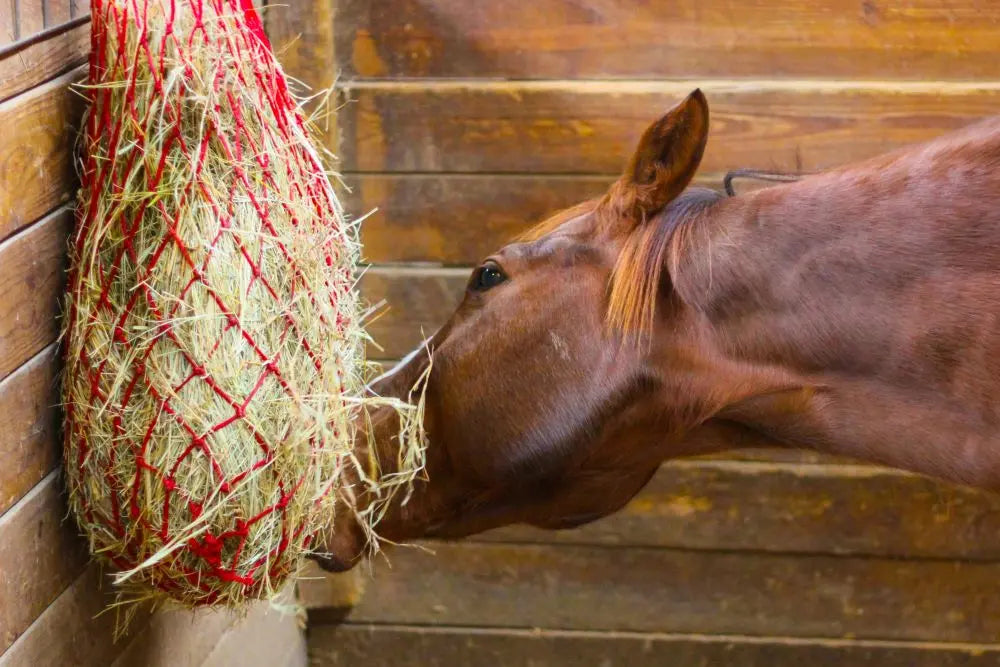From £6.99

How much hay should a horse eat? A Horse hay calculator guide
If you’ve ever asked yourself “how much hay should a horse eat?” then you’ve come to the right place. In this blog post, we’ll be discussing how to determine the right amount of hay for your horse with a Horse Hay Calculator Guide. It’s important to get the right amount of hay for your horse, as it’s the main source of nutrition for your four-legged friend. Read on to learn more about this useful tool and how to use it.
Understanding a horse's dietary needs
When it comes to feeding a horse, it's important to understand their dietary needs. Horses are grazing animals and require a diet that is high in forage. Forage is a type of plant material that horses can digest, and it includes hay, grass, and other plants. Forage should make up the majority of a horse's diet, and they should be eating small amounts of it frequently throughout the day.
A horse's body weight and size also play a crucial role in determining how much hay they need to consume per day. For example, a 500kg horse will require a different amount of hay per day than a pony. Horses require approximately 2-2.5% of their body weight in forage per day. Therefore, a 500kg horse will need between 10-12.5kg of hay per day.
It's important to note that the amount of hay a horse needs per day may vary depending on several factors. One of the biggest factors is the horse's activity level. Horses that are working or exercising more frequently will need to consume more hay per day than horses that are not as active. Additionally, pregnant mares and nursing foals may require more forage per day.
There are also several different types of hay available for horses. Common types of hay include alfalfa, timothy, and orchard grass. Each type of hay has its own unique nutritional value, and some may be more suitable for horses with certain dietary needs or conditions.
One way to ensure that a horse is receiving the appropriate amount of hay per day is to use a horse hay calculator. This calculator takes into account a horse's body weight, activity level, and the type of hay being fed to determine how much hay they should consume per day.
In addition to using a hay calculator, it's important to monitor a horse's hay intake and adjust it as necessary. Using horse hay nets can be a great way to control a horse's hay consumption and prevent them from overeating. It's also important to ensure that hay is being fed in a clean and dry environment to prevent mold growth.
Types of hay for horses
When it comes to feeding your horse, hay is an essential component of their diet. However, not all hay is created equal, and choosing the right type of hay for your horse can have a significant impact on their overall health and well-being.
There are several different types of hay commonly fed to horses, each with its own set of benefits and drawbacks. The most common types of hay include:
- Timothy hay: This is one of the most popular types of hay fed to horses in the UK. Timothy hay is high in fibre and low in protein, making it an excellent choice for horses that are easy keepers or have a history of digestive issues. It's also low in sugar and starch, which makes it an excellent choice for horses that are prone to laminitis.
- Meadow hay: Meadow hay is a popular choice for horses in the UK. It's high in fibre and can be a good source of nutrients, depending on where it was grown. However, the nutrient content of meadow hay can vary depending on factors such as soil quality, climate, and harvesting techniques.
- Alfalfa hay: Alfalfa hay is a high-protein hay that's often used to supplement a horse's diet. It's an excellent choice for horses that need to gain weight or build muscle. However, it's also high in calcium and can lead to urinary tract issues if fed in large quantities.
- Orchard grass hay: Orchard grass hay is similar to Timothy hay but has a sweeter taste. It's high in fibre and low in protein, making it an excellent choice for horses with digestive issues. However, it's not as widely available as some other types of hay.
When choosing hay for your horse, it's essential to consider their individual needs. For example, a 500kg horse that's in light work may need a different type and quantity of hay than a 500kg horse that's in heavy work. It's also important to consider factors such as the quality of the hay, the age and health of your horse, and any existing health issues they may have.
In addition to choosing the right type of hay, it's also important to feed your horse the right amount. As a general rule, horses should be fed between 1.5% and 2.5% of their body weight in hay per day. So, a 500kg horse would need between 7.5kg and 12.5kg of hay per day.
Factors that affect a horse's hay intake
There are several factors that can affect a horse's hay intake. These include the horse's age, weight, activity level, health status, and the quality and availability of the hay. Understanding these factors is crucial in determining how much hay to feed your horse.
As horses age, their digestive system becomes less efficient, which means that they require more hay to maintain their weight. A senior horse may need up to 50% more hay than a younger horse.
A horse's weight is one of the most important factors in determining its hay intake. On average, a 500kg horse should consume around 10-15kg of hay per day. However, if your horse is underweight, it may need more hay to gain weight, while an overweight horse may need less hay to maintain a healthy weight.
Horses that are in regular work or have a higher activity level will require more hay to fuel their energy needs. This is because they burn more calories and therefore need more fuel in the form of hay.
Horses that are recovering from an illness or injury may need more hay to support their recovery. Similarly, horses that have a chronic health condition such as Cushings or laminitis may need to be on a restricted diet, which could affect their hay intake.
Quality and availability of hay. The quality of hay can also affect how much a horse will eat. Hay that is of poor quality may be less palatable, and horses may not eat as much of it. Similarly, if hay is not readily available, a horse may be forced to eat less than it needs.
When determining how much hay to feed your horse, it's important to consider all of these factors and adjust your horse feed accordingly. Keep in mind that every horse is unique and may require a slightly different feeding regimen to stay healthy and maintain a healthy weight.
How to calculate the right amount of hay for your horse
Feeding your horse the right amount of hay is important for maintaining its overall health and wellbeing. It's crucial to understand the factors that affect your horse's hay intake and how to calculate the appropriate amount for your horse's specific needs.
Step 1: Know Your Horse's Body Weight
The first step to calculating the right amount of hay for your horse is to know your horse's body weight. The average weight of an adult horse is approximately 500kg. However, it's best to weigh your horse accurately using a weigh tape to ensure accuracy.
Step 2: Determine the Forage Requirement
A horse's forage requirement depends on its weight, age, breed, activity level, and health condition. A general rule of thumb is to feed at least 1.5-2.5% of a horse's body weight in hay or forage per day. This means that a 500kg horse requires between 7.5-12.5kg of hay daily.
However, this rule of thumb is only a starting point. You may need to adjust your horse's hay intake based on their specific needs and the quality of hay you are feeding.
Step 3: Evaluate the Hay Quality
Hay quality plays a significant role in determining the amount of hay your horse needs. High-quality hay is more nutritious and requires less consumption compared to lower-quality hay. Therefore, it's essential to evaluate the hay's quality before feeding it to your horse.
To determine the hay quality, look for hay that has a bright green colour, a sweet smell, and free of dust and mould. Hay that has been harvested earlier in the season is generally more nutritious than hay that has been harvested later in the season.
Step 4: Monitor Your Horse's Condition
After determining the right amount of hay for your horse, it's essential to monitor your horse's condition to ensure they maintain a healthy weight. If your horse is losing weight, you may need to increase their hay intake or feed them a higher quality of hay. Conversely, if your horse is gaining weight, you may need to decrease their hay intake or adjust their diet accordingly.
Feeding the right amount of hay to your horse is critical to their health and wellbeing. By knowing your horse's body weight, determining their forage requirement, evaluating the hay quality, and monitoring their condition, you can ensure your horse receives the appropriate amount of hay to stay healthy and happy.
Tips for feeding hay to horses
Feeding hay to horses is an important part of their diet, but it's not as simple as just giving them a bale of hay and letting them have at it. Here are some tips to help ensure your horse is getting the right amount and type of hay:
- Choose good quality hay: The quality of the hay you feed your horse is crucial to their overall health. Hay should be green, clean, and free from dust, mold, and other contaminants. Choose hay that is appropriate for your horse's age, weight, and activity level.
- Feed hay frequently: Horses are designed to eat small amounts of food frequently throughout the day. Feeding hay two to three times per day will help to ensure your horse is getting a steady supply of nutrients.
- Use slow feeders: Slow feeders are a great way to help horses regulate their intake of hay. They are designed to allow horses to access hay slowly, which can help to reduce the risk of colic and other digestive issues.
- Monitor your horse's weight: It's important to keep an eye on your horse's weight, as feeding too much or too little hay can have a negative impact on their health. A general guideline is to feed around 1.5-2% of a horse's body weight in hay per day. For example, a 500kg horse should be fed around 7.5-10kg of hay per day.
- Make sure hay is fresh and clean: Horses are very sensitive to the smell and taste of their food. Hay that has been left out in the sun or has become damp can spoil quickly, and may not be appetizing to your horse. Make sure to store your hay in a cool, dry place, and clean up any leftover hay from feeders.
- Be aware of your horse's special needs: Some horses may have specific dietary needs or restrictions, such as those with metabolic disorders like insulin resistance or Cushing's disease. Be sure to work with your veterinarian to develop a feeding plan that is appropriate for your horse.
By following these tips, you can help to ensure your horse is getting the right amount and type of hay to support their health and well-being. Feeding hay is an important responsibility for any horse owner, so take the time to educate yourself and develop a plan that works for your horse's individual needs.
